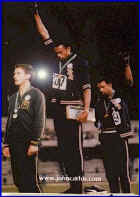 The enlightening HBO
documentary "Fists of Freedom" will be rebroadcast
for the final times Tuesday and Friday. Those who haven't seen
it should. Those who have seen it should see it again.
The enlightening HBO
documentary "Fists of Freedom" will be rebroadcast
for the final times Tuesday and Friday. Those who haven't seen
it should. Those who have seen it should see it again.
When you understand the
subplots, personal pressures and social climate that led to
the dramatic raised-fist gestures by Tommie Smith and John
Carlos on the victory stand at the '68 Summer Games in Mexico
City, you understand they weren't just gestures by two men,
but an entire track team that cared about more than just
itself.
That's the point Brent
Musburger and many of the journalists who covered the event
couldn't or wouldn't understand. Musburger, then a columnist
for the Chicago American, criticized Smith and Carlos, calling
them, "black-skinned storm troopers." Interviewed
earlier this month by The New York Times about what he had
written 30 years ago, Musburger said his words were, "a
bit harsh," but went on to belittle the act of protest by
saying, "Did it improve anything?"
It's startling that such a
cynical response would come from someone who makes a handsome
living covering black athletes. Perhaps since Musburger is not
"black-skinned" he fails to understand that the
"Fists of Freedom" were, as Smith said, "a plea
for racial justice," not only on the athletic field but
in American society.
For that, Smith, Carlos and the
entire '68 track team should be praised even if it comes 30
years after the fact.
"Did it improve
anything?" Perhaps not to the eye that's unwilling to see
improvement. Certainly, not enough black athletes have become
owners, general managers and coaches of professional sports
teams. But many have. The black athlete of today is not like
the black athlete of the '60s, who was for the most part
forced to do what he or she was told.
To protest meant being banned.
The black athlete of today is more inclined to confront any
hint of racial injustice, though the perpetuated notion is
that they never do enough.
When Tiger Woods and Serena
Williams can win professional golf and tennis tournaments in
the same weekend and prosper in careers established under
their own terms, that's improvement.
When black athletes can command
major dollars in personal contracts and endorsements, that's
improvement.
When an African-American can be
the president of baseball's National League, or become the
president of the NFL Players' Association, or command the kind
of power that Michael Jordan has from basketball, that's
improvement.
All are reaping the fruits in
some fashion from what the black athletes did in the '68
Summer Games, a courageous stand personified by the raised,
gloved fists of Tommie Smith and John Carlos.
The HBO documentary tells us
the gestures came from the black athletes yearning to make a
statement amid the turbulent social and political climate of
that era.
Martin Luther King and Bobby
Kennedy had been assassinated, there were protests over the
war in Vietnam, there were riots in the streets. We learned
that the athletes had discussed boycotting the Olympics before
deciding to make their own individuals protests.
Some wore black socks, some
wore black arm bands, others wore black shoes. But it was the
raised fists of Smith and Carlos that proved most powerful and
provocative. "People thought the victory stand was a hate
message, but it wasn't," Smith said. "It was a cry
for freedom."
To the members of that '68
team, Mexico City remains a endearing period in all of their
lives.
"It was a wake-up call for
me that it was bigger than track and field," said Larry
James, a sprinter and gold medalist on the team. "You
couldn't straddle the fence, either. You had to pick a side.
But all the guys were special in their own right. I wouldn't
trade the experience for anything."
After holding a reunion in
1988, members of the '68 team decided to form an organization
called the International Medalist Association. The
organization consists of black and white Olympians whose
primary objective is to motivate and give wisdom to youth.
"Being Olympians, we talk
to youngsters about life skills," said IMA President Ron
Freeman. The organization is based in Baltimore, but its
influence reaches all the way to Africa, where clinics are
held for young track and field hopefuls.
"We felt there were needs
that haven't been met with respect to utilizing one of the
best resources in the world to fight low self-esteem, drugs
and poverty, which is the Olympic athletes," Freeman
said.
Freeman said the roots of the
organization began in Mexico City, because the idealism is the
same.
"It's about human
rights," he said. "It's about caring about your
fellow man."
Freeman was a member of the
gold medal-winning 4x400 relay team in '68. Carlos is actively
involved in the organization, as is sprinter Lee Evans and
James.
They can be reached through
their website, at www.internationalmedalist.org.
"The '68 team is together,
white and black," Freeman said. "People from that
'68 [team] have had an impact on succeeding teams by giving
them tips and support."
Said James, now the assistant
dean of students and director of athletics at Richard Stockton
College near Atlantic City: "There are 7,000 Olympians in
this country and 2,200 have medals. Each of them have a story
of how they got there. And they've gone on to have other
careers and make contributions to society."
So did the raised fists of John
Carlos and Tommie Smith improve anything? Every single day.
reprinted from the New York
Post
click here for other archive articles
click here for current articles



